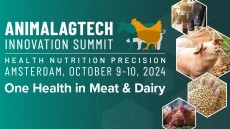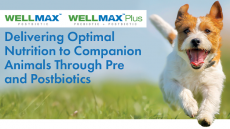ProAgni and Austrianova align on shelf-stable probiotics for cattle feed

The company has signed a licensing and manufacturing agreement with Singaporean biotech, Austrianova, that foresees an intensification of joint activities between the two companies in the area of development and commercialization of shelf-stable probiotic additives for cattle feed.
ProAgni’s first commercial product, ProTect, helps take antibiotics out of the food chain – it is a prebiotic that works with the ruminal microbiome to promote the growth of beneficial bacterial and to control ruminal pH. The company claims the product maintains production efficiency or improves it by up to 30% when baselined against other medicated feeds, and that it can also lower methane intensity.
But ProAgni has a probiotic product in development as well that is aimed at promoting feed efficiency while reducing methane emissions. And it is in relation to this platform that Austrianova’s patented Bac-in-a-Box encapsulation tool is proving to be a game-changer, according to Warren Lee, commercial director, ProAgni.
The intensified relationship between the companies is built on the positive data that has been generated from a field trial of Bac-in-a-Box encapsulated, strictly anaerobic bacteria in cattle that they said showed greatly enhanced shelf life and improved delivery of the bacteria to the rumen to enhance the microbiome along with improved production efficiency in the form of weight gain.
"This kind of approach to modify the rumen can also be applied to methane reduction."
Austrianova's technology can shelf-stabilize a wide range of ruminal bacteria; it is designed to protect bacteria from stomach acid as well as to allow storage at room temperature without appreciable loss of viability. It is also said to allow delivery of greater numbers of living bacteria.
ProAgni has an exclusive license to that technology in relation to livestock applications.
Kangaroo gut bacteria
Lavington, Australia based ProAgni was founded over six years ago. The light-bulb moment for its founders came at a cattle conference held in 2015, Lee told us, with University of Queensland associate professor, Athol Klieve, presenting on why kangaroos were four to five times more feed efficient than cattle and why is it that they don’t produce methane.
“Kangaroos are not ruminants, but they are foregut fermenters. Their process of releasing energy from food is a fermentation process, which is similar to that of cattle. The University of Queensland research showed that there are species of bacteria naturally occurring in the foregut of kangaroos that digest hydrogen and don’t turn it into methane but, instead, turn it into a food source for the animal," said Lee.
The research led the ProAgni founders to hunt out the bugs sitting in the microbiome of cattle that could be useful to improve feed efficiency and reduce methane output, working on the understanding that unless new technology makes economic sense for farmers, it is not going to be adopted, he added.
“We identified those bacterial species but the challenge with them and other key cornerstone species in that ruminal microbiome is most of them are anaerobic. Some of them are strictly anaerobic, which means developing a commercial probiotic product based on those species was deemed to be virtually impossible; they are also very hard to culture and to shelf stabilize. But, by working with Austrianova, we have solved that problem.”
Austrianova had devised its encapsulation technology with a completely different goal in mind. “But what they have developed works for us and that combined with our own intellectual property has led to this really exciting breakthrough,” Lee said.
The ruminal microbiome is a dynamic system. It tries to rebalance itself, he commented. "Our approach to this is to try and get under the hood and actually directly alter that microbial population."
ProAgni is currently working with single bacterial species. "The first species that we started with is Megasphaera elsdenii, a lactic acid consumer.”
Feed efficiency
Clinical testing that the developer undertook on shelf-stable probiotics with the Queensland Department of Agriculture and Fisheries (QDAF) shows the technology can reduce induction time from grass to grain, increase weight gain in livestock, and optimize feed utilization.
“When animals are transitioned from a grass diet to a grain diet, it is usually a complicated and risky process that takes two to four weeks. Using the encapsulated Megasphaera, we can take that time down to three days. Farmers can, therefore, get animals to target weight three weeks quicker.”
Fundamentally, methane is a waste byproduct of inefficient digestion, noted Lee. “And the more you can improve feed efficiency, the less methane output can you get, measured per kilo of meat or per liter of milk.”
For clinical testing of the encapsulated M. elsdenii, the dry form of the probiotic was sprinkled into the feed trough.
ProAgni maintains that this shelf-stable probiotic, which is suitable for use in intensive cattle production systems, can be used throughout the entire feeding cycle as it is “relatively natural and not a chemical product" but longer terms studies are required to prove that.
Such studies would also need to leverage more direct methane emissions measurement models such as the GreenFeed turn-key system, said Lee.
And he questions the methane reduction claims of other contenders in this space:
“I see plenty of companies publishing really big headline numbers [for their methane emissions reduction solutions] but those reduction percentages are often only based on 30 or 100 days of a 1,000-day feeding cycle. So, we don’t know if those products can maintain their efficacy over a longer period.”
Indeed, a report released last month by Meat and Livestock Australia (MLA) on the findings of one of the longest commercial trials ever conducted of a supplement derived from the red seaweed species, Asparagopsis, shows much lower reductions in methane production than previous studies.
The supplement was added to the diets of 40 wagyu cattle in an Australian feedlot for 300 days. The methane they produced was cut by 28% as opposed to the reductions of between 80 and 90% seen for such seaweed products in previous trials of much shorter duration. The trial also found the cows given the supplement ate less food and weighed 15kg less by the time they were sent for slaughter.
Next steps
ProAgni is planning to do "a reasonable size" Series A, probably midway through next year. "We are just waiting for more bankable research results before we do that,” remarked Lee.
The developer will also look to scale its shelf-stable probiotic production platform.
In addition, ProAgni will continue to extent the footprint of its existing product, ProTect, in the US market, where the firm has gained traction having been named as the $1m grand prize winner of the Grow-NY Food and Agriculture competition in November 2022. “That gave us a platform to launch aggressively into the US.”
















